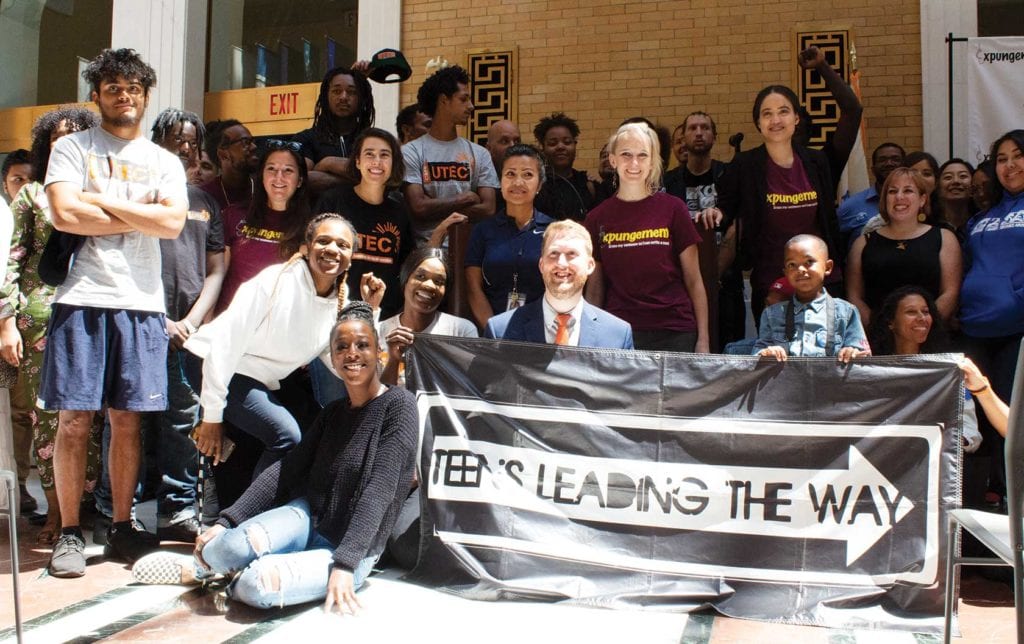
Advocates celebrated the adoption of landmark criminal justice reforms at the Statehouse last week, while legislators called for continued action.
Three months after the bill was signed by Gov. Charlie Baker, more than 100 youth justice advocates met for the Youth Justice Champion Awards in the Great Hall on Thursday, July 12, to thank the Legislature for their support in passing the sweeping reform bill, the first in 25 years.
“With the legislation that we passed we made a giant step in making Massachusetts a more equitable place to live, especially for the young people of our state,” said House Speaker Robert DeLeo during the event.
DeLeo was one of many legislators presented with gray sheets of engraved rock, symbolizing the “clean slate” it is hoped this bill will provide for youth with criminal records.
“Young people need multiple chances to fail and to grow,” said Jefferson Alvarez, a 21-year-old from Lawrence who was charged with assault and battery with a dangerous weapon after kicking a fellow student with his shoe. The bill will allow Alvarez to have his criminal record expunged and pursue his career as an emergency medical technician.
Alvarez, a youth leader for UTEC, which supports young people experiencing violence, was one of four advocates presenting awards and representing the youth justice groups who helped get the bill passed.
Other hosts and co-sponsors included nonprofit Citizens for Juvenile Justice; Stephanie Bellapianta from Teens Leading the Way, a youth-led coalition seeking policy change; India Drayton from I Have A Future, which campaigns for youth jobs and an end to mass incarceration; and John Pereira from College Bound Dorchester, a group providing academic and emotional support to potential college students with dysfunctional backgrounds.
As senators and representatives collected their awards, Sen. Karen Spilka spoke of the groups’ “infectious passion” for reform. Sen. Jeffrey Sanchez praised DeLeo for his efforts and said the reforms were “life saving” for many.
The bill overhauls several significant elements of the state’s criminal justice laws. Reforms include raising the age of criminal responsibility from 7 to 12 years of age, banning solitary confinement for juveniles, limiting shackling for youth in court, and expungement for minor crimes committed by youth under the age of 21.
But, many legislators stressed the need for even greater changes.
In her opening statement, state Rep. Kay Khan identified 18-to-24-year-olds as “emerging adults” whose brains are still not fully developed, and argued that the age of responsibility needs be raised to reflect this scientific fact. “There’s still a lot for us to do,” said Khan. “We’ll just keep going.”
Sanchez said working on the budget for the bill was the logical next step, a task he has taken up with Spilka and others.
Gov. Baker filed a supplemental budget bill in May, seeking $54.9 million in order to implement the changes and provisions laid out in the bill, a significant increase from the $15 million he requested when the bill was signed on April 13.
Sen. William Brownsberger, who worked closely with youth justice groups on the issue of expungement, said the bill showed that society is beginning to recognize that “what we need is to lift people up, instead of locking them up.”
He added, “We got something really big done this year and that’s beautiful, but we know there’s a lot more to do, and the way we’re going to get that more done is we’re going to keep talking. We have to keep understanding … what it is that’s most important to help people get themselves up and get going in the direction they need to go in.”
Rep. Andres X. Vargas, a former organizer for Teens Leading The Way and a White House intern during the Obama administration, made his position clear.
“I’m challenging you to ask what more we can do,” said Vargas, calling on advocates to recharge before tackling the complex issue of racial disparity in the prison population.
According to figures from 2015, presented by the NAACP, African Americans and Hispanics make up approximately 56 percent of the prison population, despite only comprising 32 percent of the U.S. population.
Vargas said that the use of diversion programs, such as community service, as an alternative to jail sentences, should be increased. Like Khan, he also would like to see the age of responsibility raised even further.
“We can do more,” said Vargas, urging advocates to “march on, keep thinking, keep dreaming.”


![Banner [Virtual] Art Gallery](https://baystatebanner.com/wp-content/uploads/2024/04/Cagen-Luse_Men-at-store-e1713991226112-150x150.jpg)



